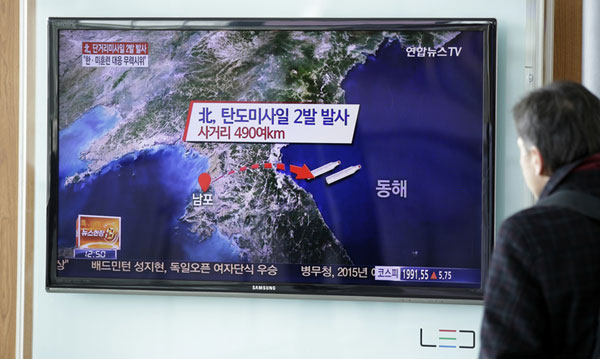Region needs to work for Peninsula stability
By Wang Xiaobo (China Daily) Updated: 2015-03-03 08:03
 |
|
A man watches a TV news program reporting that the Democratic People's Republic of Korea fired two short-range ballistic missiles, at Seoul Railway Station in Seoul, South Korea, March 2, 2015.[Photo/IC] |
The atmosphere on the Korean Peninsula is once again strained with the joint military exercises Key Resolve and Foal Eagle by the Republic of Korea and the United States, which began on Monday, and the responding call by the leader of the Democratic People's Republic of Korea Kim Jong-un for the DPRK forces to be ready for an "inevitable war" with the US in the future. The DPRK fired two short-range missiles into its eastern waters on Monday when the US and the ROK kick off their joint annual military exercises.
The Korean Peninsula has been in a state of separation and at times on the verge of war for 70 years, and thus any behavior that exacerbates tensions constitutes a substantial threat to both the peninsula and the whole of Northeast Asia. The regular US-ROK military drills, and the warnings or threats from the DPRK countries have contributed to the current tensions on the Korean Peninsula. Properly handling the nuclear issue on the peninsula and the security relations in Northeast Asia are urgent problems Northeast Asian countries have to address.
The parties concerned should discard the Cold War mentality on the basis of the joint statement issued by participants of the Six-Party Talks on Sept 19, 2005, in which the DPRK made a commitment to abandon all nuclear weapons and nuclear programs and in return the US promised not to launch an attack against it, and the ROK agreed not to possess its own nuclear weapons. The "action for action" principle should be adhered to. The parties should also try to free themselves from the long-contentious argument of which comes first, Pyongyang's abandoning of its nuclear programs or security guarantees for the DPRK.
The common ethnicity, language and culture between the DPRK and the ROK as well as the widely recognized consensus that escalated tensions are not beneficial to political and social stability on both sides of the peninsula and might even trigger a war make it possible to realize peaceful coexistence on the peninsula. The practical and strategic demands of stakeholders for peace and stability in Northeast Asia also increase the possibility of this.

I’ve lived in China for quite a considerable time including my graduate school years, travelled and worked in a few cities and still choose my destination taking into consideration the density of smog or PM2.5 particulate matter in the region.











